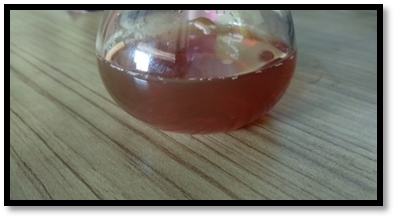Aqueous Stable Silver Nanoparticles Derived from Nimble Leaves of Psidium Guajava by Keyur D Bhatt* in Integrative Journal of Conference Proceedings_ Integrative Journal of Conference Proceedings

Abstract
Here,
we report the synthesis of silver nanoparticles (AgNPs) by utilizing extract of
Psidium guajava. In this study leaf was with extricated alcohol, further this
extract is utilized for the preparation of nanoparticles followed by treatment
with silver nitrate solution. Color change from colorless to dark-yellow and
SPR band (UV-Vis) 420nm which indicates the synthesis of plant reduced silver
nanoparticles. The presences of proteins as capping agent, which increase the
stability of AgNPs in the colloids, are characterized by Fourier transform
infrared spectroscopy (FTIR). Transmission electron microscopy (TEM)
demonstrated the presence at spherical AgNPs in the range of 15-30nm. The
bactericidal activity of standard antibiotics was essentially expanded in the
presence of AgNPs against pathogenic bacteria, S Aureus, Staphylococcus, E Coli, P Putida
and fungus A Niger.
Introduction
A
nanoparticle is a substance with a size of 1-100nm; containing tens to
thousands of particles. The interfacial level generally comprises inorganic and
organic particles [1]. The prefix word nano commonly used for particles that
have size up to several nanometers [2]. The national nanotechnology initiative
defined the nanoparticle as structures have size ranging from 1-100nm in at
smallest amount one dimension [3]. Nanoparticles can be easily synthesized
utilizing different strategies by different methodologies accessible for the
synthesis of nanoparticles includes chemical, physical biological metal to
synthesize nanoparticles. Nanoparticles are various types. Organic
nanoparticles which involve carbon
nanoparticles and inorganic nanoparticles involve magnetic nanoparticles,
noble nanoparticles like gold and silver and semi-conductor nanoparticles like
titanium oxide and zinc oxide. Green synthesis furnish progress over chemical
as well as physical techniques it is prize effective, environment friendly,
easily scaled for bigger scale synthesis and this strategy no compelling reason
utilize high pressure, energy, temperature and harmful materials [4].
Nanoparticles assume a vital part in drug delivery, sensing, gene delivery,
artificial implants, diagnostics imaging, and tissue engineering.
https://crimsonpublishers.com/icp/fulltext/ICP.000519.php
For more articles in Integrative Journal of Conference Proceedings,
Please click on below link: https://crimsonpublishers.com/icp/


No comments:
Post a Comment